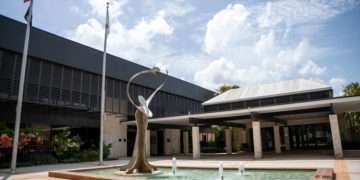As the coronavirus forced Florida and the nation into quarantine in March 2020, companies large and small suddenly needed their employees to work from home. However, while business is slowly returning to normal, the ramifications of the pivot to anywhere operations will continue to be felt for some time.
“I viewed it as an opportunity to improve our business agility. We knew we weren’t going to be able to be in an office, so we made a quick transition and invested in the same laptops where everybody had the same docking stations [and] the same monitors,” says Norman Lutz, CEO of Fort Myers-based Iron Ridge Insurance. “We completed the rest of our transfer over to being completely cloud-based so that we didn’t have any issues with servers … and everybody could access their information, no matter where they were. So it was a pretty quick transition to make a modest investment in IT and get everybody set up in their home offices at the same time.”

Norman Lutz, CEO of Fort Myers-based Iron Ridge Insurance
Lutz says his employees’ embrace of working from home was a pleasant surprise, and that the flexibility will make Iron Ridge Insurance a stronger company in the future. What’s less certain as his company continues working from home is the mental toll on his employees and customers.
“I probably have 10 phone calls or video calls with staff members a day, and they’re almost always more productive, in a way, than if we were sitting in the office together. We can share screens and there’s not a desire to hang on. People want to get back to what they’re doing,” Lutz says. “But I think … there’s an expiration date on the patience for that. I think people are getting Zoom fatigue. People are going to want to get in (to the office). We’re seeing more clients saying, ‘We’re done. Come see us.’”
While Iron Ridge Insurance had to implement a remote work plan quickly, companies such as transportation and logistics provider Scotlynn USA in Fort Myers already had anywhere operations systems in place. Putting those systems into action, however, still created a few hiccups.
“We had the ability to work anywhere from the very beginning of all this. We just didn’t have a work-from-home policy in place, nor was it part of our regular workday,” says Ryan Carter, Scotlynn USA executive vice president. “The challenge was not putting all the technology into place but educating everybody on how to use it from home. It was a matter of … preparing, just in three or four days, to make sure we were all up to speed.”
Given the fast-paced nature of his industry, Carter immediately saw some drawbacks to Scotlynn’s transition to work from anywhere. Add in some of the technical limitations faced by the company’s employees working from home, and many were eager to return to in-office work. But despite all the challenges, Carter said the feedback he received about the company’s pivot to anywhere operations definitely opened his eyes to what it means to his employees to have that flexibility moving forward.
“We’re in a pretty dynamic and crazy industry, in that when they’re shipping product all over the United States or Canada, you’re always ready for anything to happen. We do a ton of phone calls in and out of here, and have multiple phone lines and a multi-computer monitor setup. So you’re pretty efficient from a technology standpoint. And so, working from home, we lose some of that edge,” Carter says. “But now, I can see people just being actually a little more easy-going. They’re kind of ready for whatever, and their willingness to adapt and make stuff happen seems stronger now. They have a better feeling of resourcefulness, and overall, I think the fear of the unknown is less.”
FASHIONING A NEW WORK MODEL
Like many other companies, the pandemic forced Fort Myers-based Chico’s FAS Inc. to quickly pivot to a work-from-home model. But, as its offices reopened, the women’s apparel and accessory retailer realized it could offer a better fit for each of its associates through a more flexible, hybrid work model.
“As we started to [reopen] our business, we noticed the productivity was still high, and our associates were able to still do the work from their respective home offices,” says Kristin Gwinner, Chico’s FAS executive vice president and chief human relations officer. “Then we thought, ‘Wow, this is really working. Do we need to bring everybody back on site?’”
With about 60% of its roughly 1,000 associates in Fort Myers working from home, Chico’s has reduced its office footprint while adding community spaces for when remote employees need to be on campus. At the same time, the company has added more opportunities for all its employees to stay engaged, regardless of where or how they work.
“It’s really allowed an opportunity to … elevate us into a whole new way of working,” Gwinner says. “We’re still on the journey, but it sure is going well.”





